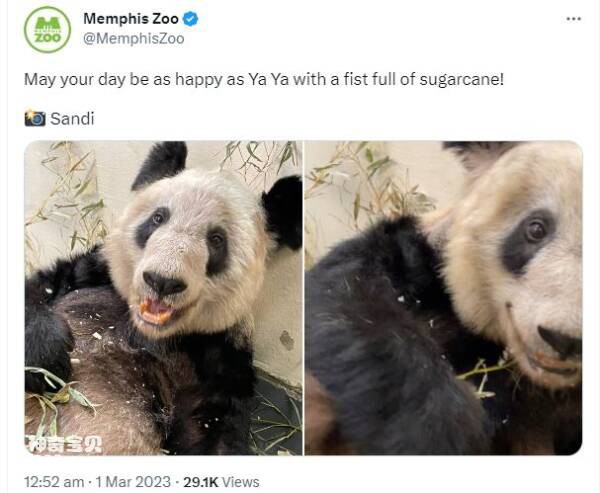A giant panda named Yaya has been a trending topic on Chinese social media over the past few weeks. The female giant panda, now living in the United States, appears to be in worrying health, with many Chinese netizens calling for her to be brought back to China. Contrary to people's imagination of pandas as round and cute, Yaya, who lives at the Memphis Zoo in Tennessee, USA, seems a little down and out. Not only does she look skinny, but her hair is sparse. His condition sparked rumors online that the Memphis Zoo was neglecting him, which upset many Chinese netizens.

According to Chinese media reports on Wednesday (March 8), the Memphis Zoo is arranging flights for Yaya to China but is awaiting approval from the U.S. government.
In 2003, the Memphis Zoo reached an agreement and signed a letter of intent with the Chinese Zoo Association to lease two giant pandas to China. Yaya and her male partner Lele then left for the United States. In December last year, the Memphis Zoo announced that because the lease agreement for the two giant pandas was about to expire, the zoo announced that it would return the two giant pandas in 2023, ending their 20 years in the United States.
However, on February 1 this year, Lele suddenly died of a heart attack at the zoo at the age of 25. The incident triggered some Chinese netizens to question whether the park was not taking adequate care of the children. The Memphis Zoo rejects the allegations of cruelty and denies that the pandas were returned because of the allegations.
The average lifespan of captive giant pandas is 25 to 30 years, and the longest known giant panda is 38 years old. In the wild, the average lifespan of giant pandas is 15 to 20 years.

Lele's death has made more Chinese netizens pay attention to Yaya's status. Some videos on social media said it was covered in dirt and displayed repetitive movements. Many netizens called for Yaya to return to China early.
"How could such a cute panda be tortured like this? I burst into tears instantly. I was so angry and heartbroken," a Weibo netizen wrote.
"Such an attitude towards our national treasure is a provocation to China. Why haven't the relevant departments solved the problem yet?" another netizen left a message.
#ayaayastillcontinue to beg for food# became a trending topic on Weibo. The platform shows that it has been clicked more than 640 million times.
The state media Global Times reported that some netizens bought a screen in New York's Times Square to play Yaya's videos and pray for her safety.
In the context of deteriorating Sino-US relations and warming Sino-Russian relations, some people also compared the experiences of "Yaya" and "Lele" with the pandas "Ruyi" and "Ding Ding" in Russia. Chinese media reported that the two giant pandas at the Moscow Zoo had gained 40 kilograms.
Many people also flocked to an organization called "Panda Voices" to launch a petition on change.org, asking Memphis Zoo CEO Matt Thompson to terminate Yaya's stay in the United States. The petition has been signed by nearly 140,000 people.
The China Zoo Association told Chinese media that China has sent experts to the United States to help take care of Yaya, and China is also ready to welcome Yaya back to the country.
Panda Diplomacy
For decades, China has used giant pandas overseas as a diplomatic tool to strengthen ties, known as "panda diplomacy." In the early days of the founding of the Communist Party of China, China only gave pandas to socialist allies such as the Soviet Union and North Korea, and later began to give pandas to Western countries as well. In 1972, after then-U.S. President Richard Nixon met with Chinese leader Mao Zedong, China sent giant pandas Lingling and Xingxing to the United States.

Pandas are unique to China and are also used as diplomatic envoys. (Data map)
In recent decades, most giant pandas have gone to developed countries with geopolitical influence, which pay annual lease fees of up to US$1 million per panda and afford specially designed venues and food.
However, life for these pandas traveling around the world has not always been smooth sailing. Finnish media reported that a local zoo was preparing to send back two giant pandas due to a lack of funds. Last month, the Japanese giant panda "Xiang Xiang" returned to China and went to Sichuan to find a mate.
animal tags:
We created this article in conjunction with AI technology, then made sure it was fact-checked and edited by a Animals Top editor.